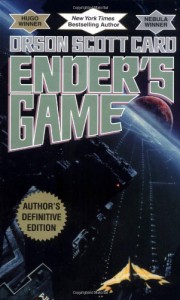Gurglings of a Putrid Stream
Thoughts on books and other assorted topics.
See also: http://goppf.wikidot.com/swstart
My name: Brian Martin
Ender's Game by Orson Scott Card

Ender's Game is like a Kidz Bop version of Bolero -- set on Repeat. It's catchy, but awfully shallow, and it's main idea is endlessly reiterated. Ender Wiggin, a brilliant young boy being groomed as a military commander, solves one new problem after another as he tackles a series of games and mock battles designed to teach him tactics, strategy, and command. Losing is not an option; neither is any limit to Ender's ability. So each "test" is a fait accompli, and it's just a matter of how many of them Orson Scott Card can cram into 300 pages.
Ender isn't just brilliant, he's the most brilliant human ever. This is reasonable because he's also superhuman. Card says he first came up with the idea for Ender's story when he was 16. That makes sense: Ender's Game is an aggressive schoolboy fantasy. Ender is lonely, misunderstood, yet clearly better than everyone else. At everything.
This more than anything else, I think, explains the book's popularity: it's escape fiction extraordinaire. Ender's not a deep boy so he's easy to identify with, and the fact that the basic scenario replays itself so many times simply mirrors our daydreams. It's a formula that defies monotony to a remarkable extent. I mean, there's always more ass to kick.
Still, it's hard to think of this book as anything more than a guilty pleasure. Ender is just too good, too smart, too tough. Even when the odds are so stacked against him that all he can do is something crazy, it turns out to be just the thing required. He absolutely cannot lose.
In sports, you hear all the time how if the play that just failed had worked, so-and-so would have been a genius, when the truth is that sometimes bad decisions turn out well and good decisions go to hell. For Ender, though, every decision is right, even those made in exhaustion after days of serious sleep deprivation. It's easy enough to see why others would follow him -- the real weirdos are the ones who don't -- but more difficult to see why I, as a reader, should care one way or the other.
 4
4
![Dawn of the Planet of the Apes [Blu-ray] - Keri Russell](http://booklikes.com/photo/max/50/80/upload/books/2/c/2cbbba26ba6981bcf1027a4a109168d9.jpg)
![Age of Tomorrow [DVD] [Region 1] [US Import] [NTSC] - Robert Picardo, Kelly Hu](http://booklikes.com/photo/max/50/80/upload/books/0/e/0e28e61992d2afc9aac2c3f2864c6692.jpg)
